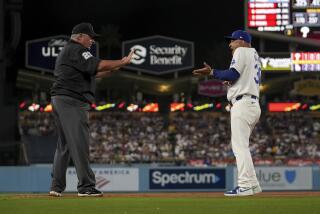WORLD SERIES : MINNESOTA TWINS vs ST. LOUIS CARDINALS : Cardinals Not Counted Out, Win by Decision : Kelly’s Pitching Change Helps St. Louis Rally to 3-1 Victory
ST. LOUIS — Upon cursory inspection, Les Straker’s glove did not have S.O.S. written in it. Straker, a Minnesota Twins rookie, had been pitching so well Tuesday night that he did not feel the need to continue his standard practice of scribbling helpful reminders in his glove between innings.
Through six innings of Game 3 of the World Series, Straker had shut down the St. Louis Cardinals on four hits, enabling the Twins to take a 1-0 lead into the late innings with a chance to take a commanding 3-0 lead in games after the two blowout wins in Minneapolis.
It has been written nearly everywhere, except maybe Straker’s glove, that Straker’s shelf life on the mound usually is six innings, if that. So Twin Manager Tom Kelly turned to relief pitcher Juan Berenguer, who needed only one inning to turn Minnesota’s 1-0 lead into a 3-1 Cardinal win before a crowd of 55,347 at Busch Stadium.
In the aftermath of a win that realistically kept St. Louis’ alive in the series, the actions and reactions were typical.
Straker said he felt strong enough to keep pitching. Kelly, in turn, said he knew Straker’s limitations and had confidence in Berenguer. And the Cardinals, well, they were quite happy with the decisions the Twins’ rookie manager had made about his rookie starting pitcher.
“I was glad to see that,” Cardinal left fielder Vince Coleman said of the move. “The only hits I have in this (series) are off (Berenguer). He (Straker) pitched a good game against us.”
Had Straker’s improbable pitching performance been preserved and the Cardinals lost again Tuesday night, they might have been written off. No team has recovered from a 3-0 deficit, and the Cardinals patchwork lineup has resembled the Out-Of-Gas Gang because of injuries.
“I’m just glad we were able to get enough runs to win,” Cardinal Manager Whitey Herzog said. “I don’t know if we are going to have enough offense to get it done. Our guys are just going to have to go out there and pitch great the rest of the way.”
Cardinal pitching, after allowing the Twins 18 runs in the first two games, was greatly improved Tuesday. Starter John Tudor gave up only one run in seven innings, and Todd Worrell earned the save with two scoreless relief innings.
But the surprising success of Straker had made the Twins’ one-run lead hold up. Straker had spent a decade in the minors and, after finally making it to the major leagues this season, had been inconsistent at best.
Tuesday night, though, Straker fooled most of his critics, as well as the Cardinals. He had averaged only 5 innings per start this season and did not make it past the third inning in the Twins’ only loss to the Detroit Tigers in the American League championship series.
Kelly, of course, was well aware of Straker’s history, which is why he had Berenguer, a right-hander, and Dan Schatzeder, a left-hander, warming up as early as the fourth inning.
When the time came for a change, Kelly went to Berenguer, who had success in the playoffs but had given up two runs to St. Louis in one inconsequential inning of Game 2.
The result this time was a typical Cardinal rally, replete with activity on the basepaths and well-placed hits. Jose Oquendo ripped Berenguer’s first pitch into center field for a single, and the Twins’ chances of holding the lead deteriorated from there.
Tony Pena hit a two-strike single to right, moving Oquendo to second. Herzog, needing to move the runners over with a sacrifice bunt, called upon injured third baseman Terry Pendleton, the club’s best bunter, to bat for Tudor.
Since Pendleton can only hit left-handed because of a pulled muscle in his rib cage, Kelly could have brought in Schatzeder to relieve the struggling Berenguer.
But Schatzeder was not even throwing in the bullpen, and Pendleton successfully bunted the runners to second and third. Then, slumping Coleman slapped a double down the third-base line, scoring both Oquendo and Pena for a 2-1 Cardinal lead.
Only then did Kelly make a phone call to the bullpen. And only after Coleman stole third and scored on Ozzie Smith’s single did Kelly replace Berenguer with Schatzeder, who then retired the Cardinals.
Kelly, perhaps knowing what the nation’s media would be writing about his decision to lift Straker and non-decision to stay with Berenguer, reacted angrily to any questioning of his managing.
“I know my ballclub better than you do,” Kelly snapped.
Berenguer, who had several strong outings against Detroit in the playoffs, is now responsible for five of the Cardinals’ seven runs in the first three games.
Tuesday night, he needed only 17 pitches to undo a surprisingly effective outing from Straker, who wasn’t expected to equal the fine pitching efforts of Frank Viola in the opening game and Bert Blyleven in Game 2.
In explaining the moves, Kelly said he was going with a reliever that had come through all season.
“Juan is our man in that situation,” Kelly said. “They had men at first and second and I thought Pendleton was going to swing. They might bunt if Schatzeder comes in, and we prefer to have (Pendleton) swinging. There was no thought of changing (pitchers).”
Kelly said his plan was to have Berenguer pitch the seventh and eighth, then bring in short reliever Jeff Reardon to pitch the ninth. That plan didn’t quite work out as planned.
Reardon usually is used for only a maximum of two innings, so if Straker could have survived another inning, Kelly conceivably could have used Reardon as his closer.
The thought was going through Straker’s mind, but he wasn’t about to approach Kelly with the idea.
“Yes, I am surprised they took me out,” said Straker, whose longest outing this season is seven innings. “I thought I could go on. I haven’t thrown the ball (as well) as that all season long.
“It’s been like this the whole year. I pitch six or seven innings, and they take me out. I always want to go all the way. But it’s my first year here. I can’t say to (Kelly), ‘Don’t take me out.’ He might get upset.”
It certainly was an upsetting loss for the Twins, especially the emotional Berenguer, who drew attention to himself with his histrionics on the mound during the playoffs.
Tuesday, Berenguer’s emotions were at the other spectrum. He sat at his locker, brooding and refusing interviews. To assure that, he only spoke in Spanish.
Elsewhere in the Twins’ locker room, though, justification for Kelly’s moves were issued by all involved.
Said Straker: “I realized he was going to do it, and I accept it. He comes to me and says he’s going to take me out for a pinch-hitter. I said I threw 90 pitches. And I say, fine.”
Schatzeder, who admitted he wanted to pitch during Berenguer’s rough period, said the decision to yank Straker was not surprising.
“We felt a good six innings would be enough and then go to either me or Juan,” Schatzeder said. “I thought he possibly should have gone with me. With (Pendleton) up, I thought it was a real possibility. But when Juan’s on, it doesn’t matter whether it’s a lefty or righty batting. He gets them out.”
Berenguer managed to get only one out during his stint, and that was the close play at first base on Pendleton’s sacrifice bunt.
Herzog said he would have had Pendleton bunting no matter if Berenguer or Schatzeder had been pitching. He said it was imperative to advance the runners with the top of his order coming up.
Improbable as it may have seemed, Straker almost pitched the Cardinals all but out of the series.
He was not overpowering, to say the least. But then, the Cardinal lineup (without Jack Clark and Pendleton) isn’t exactly a serious threat for big innings, either.
Straker pitched into jams in the second, third and fourth innings, coming up with the important outs when needed.
In the second, Straker gave up a one-out bloop single to Willie McGee. Then, he compounded the problem with a balk, which is almost as common as the notes in his glove. This time, Straker’s arm motion did not come to a complete stop before throwing to home. That moved McGee to second with two outs, and Oquendo eventually took third on a walk.
Up came Pena, who worked the count to his advantage at 2-and-1, before weakly bouncing to second.
That was merely a prelude to more problems in the third, though this predicament wasn’t entirely Straker’s fault.
Coleman reached first on shortstop Greg Gagne’s throwing error. Coleman then easily stole second base and went to third on Smith’s ground ball to first. Tommy Herr, who had hit into a double play in the first and carried an 0-for-21 streak in World Series play dating back to 1985, failed again, bouncing softly to second.
And in the fifth, McGee doubled to right with one out, but Straker emerged unscathed once more. He retired Curt Ford on a called third strike, then forced Oquendo to fly to center.
At that point, neither team had scored, and Kelly seemed ready to quit while he was ahead--or, at least, tied--and defer pitching duties to his bullpen.
But he held out another inning, and the Twins managed to eke out a run in the sixth against Tudor, who had pitched 17 innings without giving up an earned run. The last earned run Tudor allowed was a fourth-inning home run to San Francisco’s Jeffrey Leonard in the fourth inning of Game 2 of the playoffs.
The Twins, who had belted four home runs off Cardinal pitching in the first two games at the Metrodome, had to use less aggressive tactics to assume the lead Tuesday.
Tudor, showing signs of tiring, gave up consecutive walks to Gagne and Kirby Puckett with one out in the sixth. Gary Gaetti fouled out to Pena near the Cardinal dugout, and Gagne tagged up and advanced to third. Tom Brunansky knocked him in with a bloop single to right.
That 1-0 lead did not hold up, thought the Cardinals admitted to having doubts about their ability to come from behind, given their limited offensive means.
Many Cardinals were surprised that the runs they did score came against Berenguer, not Straker.
Straker, however, said he had a feeling he would pitch well on this night.
“I never felt like this, this good, my whole career,” Straker said. “I didn’t write anything in my glove. It’s all been written in there before, and I didn’t need it, anyway.”
But there was one ritual to which Straker did resort.
“I prayed a lot,” Straker said. “I prayed before the game, in here (the clubhouse). I prayed in the dugout after I came out. I was praying all during that (seventh) inning.”
So, what happened?
“Sometimes, it doesn’t work,” he said.
More to Read
Go beyond the scoreboard
Get the latest on L.A.'s teams in the daily Sports Report newsletter.
You may occasionally receive promotional content from the Los Angeles Times.










